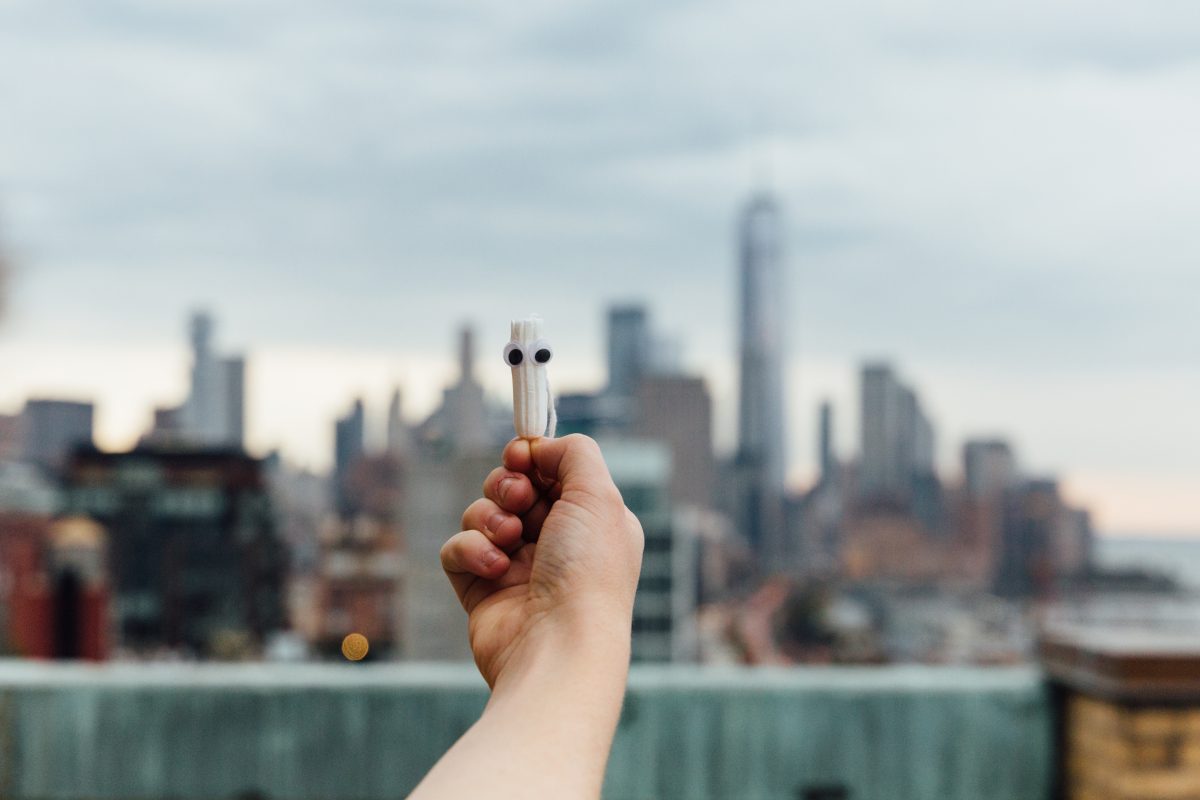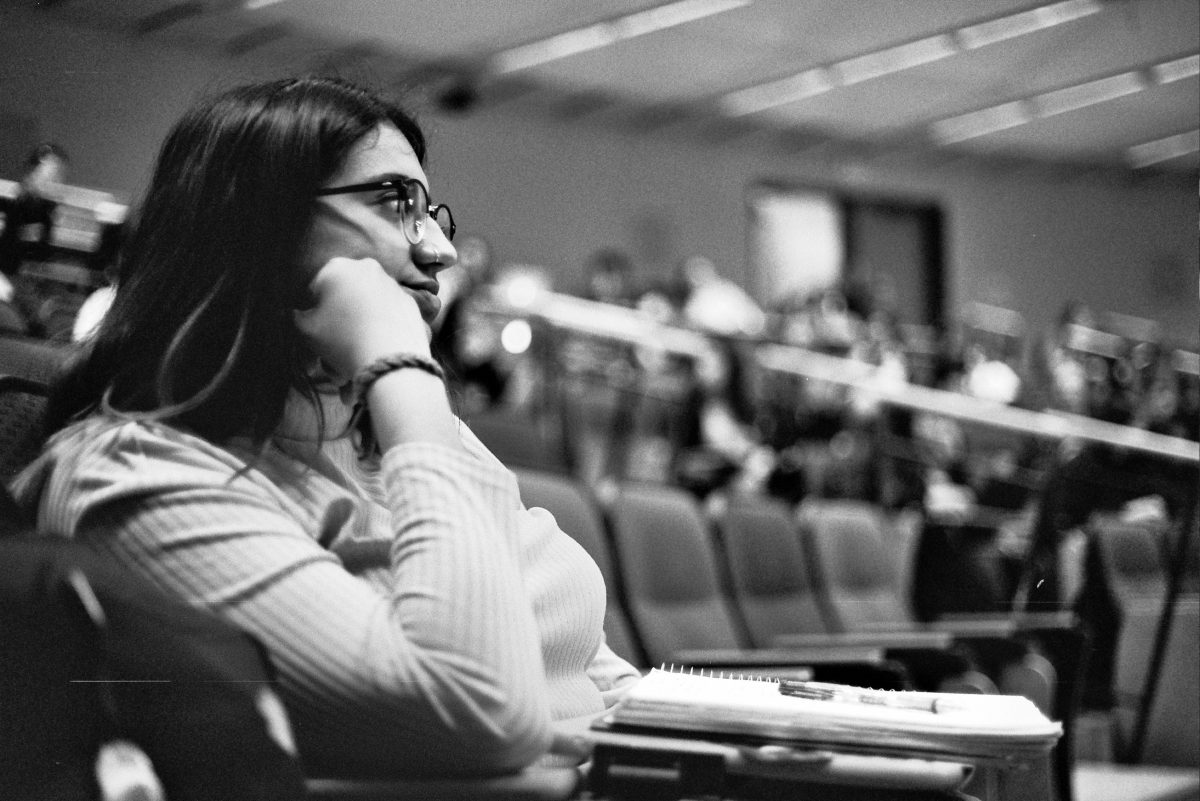White Bird White Bird Clinic crisis counselor Alese Colehour sits in a small side room on the third floor of the Eugene Public Library, eating strawberries from a full carton on a May evening.
Just beyond the open door, people browse bookshelves and maintain the quiet. The library ascends by age and genre: children and young adult books on the ground floor, nonfiction and magazines on the second floor, and adult fiction on the third f loor. A spiral staircase leads up to each floor under a glass sky bubble. Walls of windows fill the library with daylight.
Colehour is a volunteer holding White Bird Clinic’s new free drop- in counseling hours at the library. Two trained crisis counselors are always present Monday through Thursday between 5:30 and 7:30 p.m. and Saturday from 11:30 a.m. to 5:30 p.m. Anyone may come in to receive free crisis counseling—a resource for those who cannot afford therapy or encounter long waiting lists when they are in crisis.
The drop-in hours do not exclusively serve those who are in an immediate mental health crisis, but can fill a variety of functions such as helping individuals navigate systems and decide on next steps. The main difference between non-crisis counselors and White Bird’s crisis counselors is that crisis counselors do not meet with individuals on a regular, ongoing basis.
White Bird consists of a handful of offices in Eugene and Springfield that offer a range of medical services, from drug and alcohol treatment to a dental clinic. White Bird was formed in 1969 and recognized as a nonprofit in 1970. Its mission is to provide health services to all community members. The library drop-in hours are the most recent expansion of their services. Although the clinic already offers a variety of services, staff created the library program to support a more accessible space for walk-ins.
“The location was a pretty big hit,” Colehour says. “It’s centrally located, a peaceful space, and a community hub.”
This fits with a national trend of social services being offered at public libraries. These spaces have long offered free Wi-Fi as well as publicly available classroom and meeting spaces. However, they frequently offer more focused social services like job search assistance and computer skills training. In 2016, Portland’s Multnomah County library system contracted with a social worker to work on-site at their locations. Similar to the White Bird drop-in hours, it was a one-year pilot program designed to provide free services to patrons in crisis. Portland libraries developed this program seven years after San Francisco was the first city to hire a social worker for its libraries in 2009.
“Libraries are a reflection of the communities they serve,” says Multnomah County Libraries Director of Communications Shawn Cunningham.
Within the first year of working on-site, the Multnomah County social worker had contact with patrons 1100 times. Now, the system has hired two more social workers and the team collectively works 40 hours a week. They provide services ranging from assisting with filing restraining orders, to helping with searches for affordable housing, to offering shoestopatronsratherthanasking them to leave.
Attracted to White Bird’s important work, Colehour enrolled in a volunteer training for the program in 2015. She had heard about the clinic and appreciated its collective nature. She liked its model of an egalitarian pay structure and peer supervision, calling it a “radical organization” dedicated to giving people choices.
She took White Bird’s basic crisis class after the new volunteer training. Then she began picking up shifts on the 24-hour crisis line. Coleheur also started training with Crisis Assistance Helping Out On the Streets, a 24/7 mobile dispatch service staffed by medics and crisis counselors commonly known as CAHOOTS in Eugene and Springfield. She now works for both departments as a crisis counselor. Additionally, she serves as the outreach program coordinator for the new library program. Her interest in humans and their environment stems from an academic background in biological anthropology, although she likes that a White Bird employee can advance into a new position regardless of past credentials.
Before joining White Bird, Colehour was enrolled in a Ph.D. program at the University of Oregon. She felt disconnected from the human behavior she was studying, and dropped out after she earned her master’s degree. Performing a more practical community service at White Bird was a welcome change.
“It’s not about the letters behind your name,” Colehour says.
Colehour helped write the grant for the drop-in hours as behavioral health extension services in the county. Lane County gave the program funding for a one-year trial.
LaVena Nohrenberg acts as the Eugene Public Library’s Customer Experience Manager and the library’s liaison to White Bird. She points out that people first experience libraries as children and often return later in life. They tend to have gaps in awareness of resources that libraries offer.
For instance, the Eugene Public Library offers a summer reading program in which children can pick up a free book and adults can pick up free earplugs. It also houses a “maker hub,” which includes robotics, a 3D printer, and green screen, with virtual reality goggles coming by the end of June. All of these are accessible for free to cardholders.
“It’s a new way for people to look at libraries,” Nohrenberg says.
She appreciates the equalizing effect of libraries, where everyone is welcome regardless of socioeconomic status. She also calls White Bird a “great partner— the community is lucky to have such a caring organization.”
Colehour sees a more diverse population seeking resources at the drop-in hours than at the clinic itself. The clinic doubles as a day center, so unhoused individuals often spend time there, making it a more crowded and chaotic environment. Meanwhile, the Eugene Library provides a beautiful and serene space.
Mental Health America, a national nonprofit that compiles information on both prevention and intervention services, claims that one in five adults in America have a mental health condition. Their website posits that while access to insurance and treatment is generally increasing, 56 percent of Americans with a mental illness still do not receive treatment. Counselling Directory, a UK website dedicated to helping visitors find a therapist near them, claims that “the number of people seeking mental health treatment is on the rise and this is having an effect on service availability.” This suggests that the growing number of individuals seeking mental health services can saturate programs for resources and result in longer waiting periods.
“And there’s so much more you can get out of a person-to-person interaction,” Colehour says.
She recalls the hectic work at the clinic during her first weeks in the new volunteer training. Trainees listened to experienced volunteers handle calls to the clinic’s main crisis line, and phones rang incessantly.
“It’s almost a gauntlet you have to go through to see if you have the grit,” Colehour says.
By working with seasoned volunteers, trainees gain awareness of different skills people bring to the job. Colehour terms it a personal “style” of crisis intervention.
The training also provides information on setting boundaries, handling burnout and practicing self-care.
The library project might become redundant if White Bird’s crisis center moves to a new location. A new location would be separate from the day center, making it a calmer environment.
“It’s symbolic, in a way, to be [operating] in a city building that is open to the public,” Colehour says.
Whether or not the program continues is a question of funding. The county may continue funding the program after the first year. It may refer the funding to Trillium—the company that manages the Oregon Healthcare Plan—but that remains uncertain. Or the program may be defunded.
Although the program’s future is not set in stone, Colehour still thrives in her position.
“I love the unpredictability,” Colehour says. “I love the variety of people and situations. I love hearing people’s stories. I love being there for people on their toughest day.”








![[Photo Courtesy of the Lara Family]
Ruben embraces his beloved childhood goat, Katrina.](https://ethos.dailyemerald.com/wp-content/uploads/2025/05/katrina-1-1060x1200.jpg)


